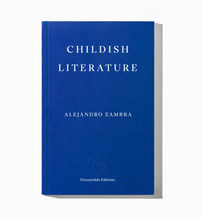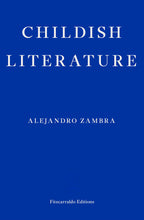How do we write about the singular experience of parenthood? Written in a ‘state of attachment’, or ‘under the influence’ of fatherhood, Childish Literature is an eclectic guide for novice parents, showing how the birth and growth of a child changes not only the present and the future, but also reshapes our perceptions of the past. Shifting from moving dispatches from his son’s first year of existence, to a treatise on ‘football sadness’, to a psychedelic narrative where a man tries, mid-magic mushroom trip, to re-learn the subtle art of crawling, this latest work from Alejandro Zambra shows how children shield adults from despondency, self-absorption and the tyrannies of chronological time. At once a chronicle of fatherhood, a letter to a child and a work of fiction, Childish Literature is the latest, virtuosic addition to the oeuvre of one of the most exciting Latin American writers in recent decades.
‘Childish Literature shows boundless – and bounding – enthusiasm for the chaos and curiosity that his son, Silvestre, has brought into his life…. Alejandro Zambra makes being a writer seem like the least solitary, most joyful job in the world – an enthusiasm that makes this his most engaging book yet’ Jonathan Gibbs, Times Literary Supplement
‘Zambra is peerless in his sensitive exploration of the condition of fatherhood – the joys, the complications, the surprises – where being a father is less of a given than something to be earned…. Becoming a father teaches Zambra much about what it is to be a writer and a reader. Writing increasingly appears to Zambra as an extension of play, the adult refuge for the imaginative possibilities of childhood…. Zambra’s readers … will not readily forget a work that rescues the extraordinary adventure of fatherhood from the box-ticking dutifulness of parenting manuals.’ Michael Cronin, Irish Times
‘It represents fatherhood as an emotional and intellectual relationship not just to a child but also to childhood, with all of the growth and exploration and confusion that entails….. It has memoir and fiction, ordinary linear essays and more fragmentary ones. It’s an appealing jumble – as is fatherhood itself … full of quotidian pleasure, and of play…. Zambra’s book doesn’t omit the trials and complications of having children … but no matter how much unease appears in the book, [it] remains affectionate and optimistic, expansive.… It defies not only conventions of literary masculinity but also an entrenched, persistent vision of fatherhood as part of a man’s private rather than public life. Zambra represents fatherhood as a form of participation in society.’ Lily Meyer, The Atlantic
Physical info: 4.92 x 0.83 x 7.76 | 216 pages | Paperback




